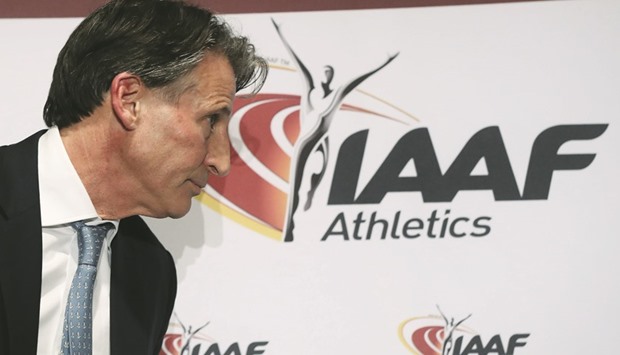The IAAF has the chance to distance itself from “grotesque stories” of corruption when members vote today on a raft of revolutionary reforms drawn up by president Sebastian Coe.
Since Coe took office in August 2015, the IAAF has been mired in the fall-out from disgraced predecessor Lamine Diack, at the centre of a corruption scandal in which several former senior IAAF officials were found to have bribed Russian athletes to keep quiet over positive doping tests.
“Now is not the time to take our foot off the pedal. We have a momentous opportunity on Saturday to restore credibility and pioneer a new era of transparent and accountable sports administration,” Coe said.
“We are guardians, not owners of this sport and as such we have an obligation to lay the right foundations for future generations who will sit in our places and compete in our events.”
Coe, whose proposals go before a Special Congress today, added: “This is a pretty important week in the history of our sport. Because I do not want us ever to return to the grotesque stories that even over the last few days we have been waking up to.”
The latest revelations, coming as yet more athletes were stripped of medals following re-tests dating back to 2008, saw French newspaper Le Monde and German broadcaster ARD report that the practice of covering up Russian anomalies was more widespread than initially thought.
Coe’s reforms, with a nod to Diack’s abuse of the presidency, include stripping himself of some powers, with the president and IAAF Council not allowed to serve more than 12 years and with more checks put in place.
They also push for gender balance, handing athletes a greater voice and crucially establishing an independent integrity unit that would manage all anti-doping matters and be responsible for greater intelligence gathering.
“This is a moment to be bold, not to be timid,” Coe said. “The reforms create the strongest set of foundations upon which we need to build new fans, create new formats, to find new partners and frankly to create new and exciting events.
“We must engage with young people, we must find new fans — and that sits at the heart of our strategy.”
Coe needs the backing of two-thirds of the 214 federations that will vote today to get the proposals passed.
“We must accept that the reputation of the IAAF and athletics has been tarnished by events that came to light a year ago,” Coe says in his ‘Time for Change’ manifesto.
“We still have a lot of work to do to restore our reputation, credibility and trust within our own sport and the wider world of sport.”
Coe seems to have wide support from athletes, Kenya’s 800m great David Rudisha saying: “Our sport has been going through a lot of turbulence of late, one being the problems with doping and there’s a lot that needs to be done.
“Fighting doping must be a collective of all people starting with the citizen, athlete, manager, coaches and everyone who loves sport. Only one body cannot fight and succeed in this fight.”
Norwegian Rune Andersen, currently head of the IAAF Taskforce looking into steps Russia is taking in its anti-doping fight, said the creation of the Athletics Integrity Unit was “ground-breaking”.
“It strikes me that the new Integrity Unit could play a very important role in future in speeding up the resolution of cases and imposition of sanctions, and in helping the IAAF monitor and guide the efforts of non-compliant national federations to bring themselves back into compliance with the anti-doping and other integrity requirements of IAAF members,” Andersen said.

coe
